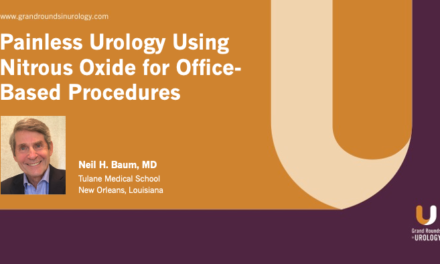Peter C. Fisher, MD, presented “Physician Burnout, and Life After Death” during the 1st Advances in Men’s Health conference in August 2021.
How to cite: Fisher, Peter C. “Physician Burnout, and Life After Death.” August 2021. Accessed Apr 2024. https://grandroundsinurology.com/physician-burnout-and-life-after-death/
Physician Burnout, and Life After Death: Summary
Peter C. Fisher, MD, Chief of Surgery and Director of Men’s Health Services at St. Mark’s Hospital in Salt Lake City, Utah, begins his talk on physician burnout with a personal story that changed his life. His hope is that in sharing what he learned through this experience, he can help those in his field become more integrated, less individual, more committed, and less comparative. Dr. Fisher experienced sudden cardiac arrest (SCA) while playing basketball at age 45. SCA (called sudden cardiac death in those who do not survive) carries a 90 percent mortality and 95 percent morbidity rate. Dr. Fisher discusses the experience of being pulseless for 11 minutes and the actions of the people who, collectively, saved his life. Dr. Fisher has now experienced what he calls “life after death,” which has led him to shift priorities, find greater joy, and recognize the failures of the pre-dying life, which he describes as ambitious, strategic, and independent. Conversely, he characterizes his life after death as relational, intimate, and relentlessly grateful. Dr. Fisher shares several observations, explaining that before the experience, he defined success according to his contribution to various projects and was addicted to the praise that “success” garnered. Now, he recognizes that the quality of his relationships defines his success. This near-death experience allowed Dr. Fisher to more clearly see the distinction between where he is wanted versus where he is needed. Dr. Fisher shares that, in his new life after death, his wants and desires have shifted from independence to interdependence. He explains the recognition that comparison is the “robber of joy” and describes how freeing it has been to no longer carry the weight of that comparison. Dr. Fisher emphasizes that in his life after death, he has been more honest, patient, and focused on long-term gains; he characterizes life as a qualitative, rather than a quantitative, endeavor. In conclusion, Dr. Fisher explains that vulnerability can result in tremendous strength and result in warmer, joyful relationships.
About the Advances in Men’s Health conference:
Presented by Program Director Steven N. Gange, MD, FACS, the Advances in Men’s Health conference provides relevant education on major men’s health topics to both primary care and urology providers, utilizing speakers who are both leaders in their field and skilled teachers. It is hoped that a dialogue will ensue between PCPs and urology specialists that will enhance everyone’s quality of men’s healthcare delivery. Dr. Fisher presented this talk at the 2021 conference.



